CHANGE IN CONTROL SEVERANCE AGREEMENT OF KEVIN NUNLEY THIS CHANGE IN CONTROL SEVERANCE AGREEMENT (“Agreement”) is made and entered into as of this first day of July 2024, by and between HomeTrust Bancshares, Inc, Asheville, North Carolina (hereinafter...
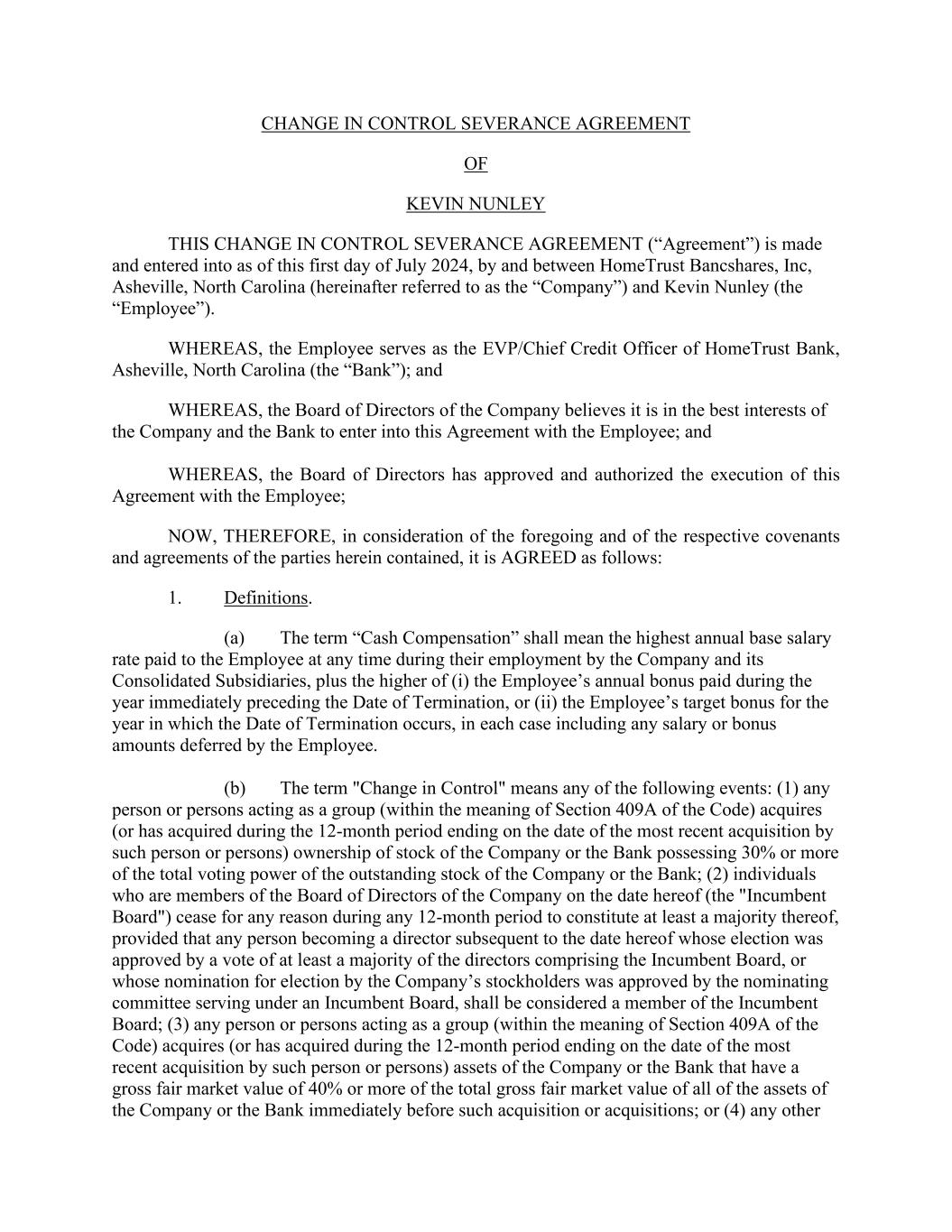
CHANGE IN CONTROL SEVERANCE AGREEMENT OF XXXXX XXXXXX THIS CHANGE IN CONTROL SEVERANCE AGREEMENT (“Agreement”) is made and entered into as of this first day of July 2024, by and between HomeTrust Bancshares, Inc, Asheville, North Carolina (hereinafter referred to as the “Company”) and Xxxxx Xxxxxx (the “Employee”). WHEREAS, the Employee serves as the EVP/Chief Credit Officer of HomeTrust Bank, Asheville, North Carolina (the “Bank”); and WHEREAS, the Board of Directors of the Company believes it is in the best interests of the Company and the Bank to enter into this Agreement with the Employee; and WHEREAS, the Board of Directors has approved and authorized the execution of this Agreement with the Employee; NOW, THEREFORE, in consideration of the foregoing and of the respective covenants and agreements of the parties herein contained, it is AGREED as follows: 1. Definitions. (a) The term “Cash Compensation” shall mean the highest annual base salary rate paid to the Employee at any time during their employment by the Company and its Consolidated Subsidiaries, plus the higher of (i) the Employee’s annual bonus paid during the year immediately preceding the Date of Termination, or (ii) the Employee’s target bonus for the year in which the Date of Termination occurs, in each case including any salary or bonus amounts deferred by the Employee. (b) The term "Change in Control" means any of the following events: (1) any person or persons acting as a group (within the meaning of Section 409A of the Code) acquires (or has acquired during the 12-month period ending on the date of the most recent acquisition by such person or persons) ownership of stock of the Company or the Bank possessing 30% or more of the total voting power of the outstanding stock of the Company or the Bank; (2) individuals who are members of the Board of Directors of the Company on the date hereof (the "Incumbent Board") cease for any reason during any 12-month period to constitute at least a majority thereof, provided that any person becoming a director subsequent to the date hereof whose election was approved by a vote of at least a majority of the directors comprising the Incumbent Board, or whose nomination for election by the Company’s stockholders was approved by the nominating committee serving under an Incumbent Board, shall be considered a member of the Incumbent Board; (3) any person or persons acting as a group (within the meaning of Section 409A of the Code) acquires (or has acquired during the 12-month period ending on the date of the most recent acquisition by such person or persons) assets of the Company or the Bank that have a gross fair market value of 40% or more of the total gross fair market value of all of the assets of the Company or the Bank immediately before such acquisition or acquisitions; or (4) any other
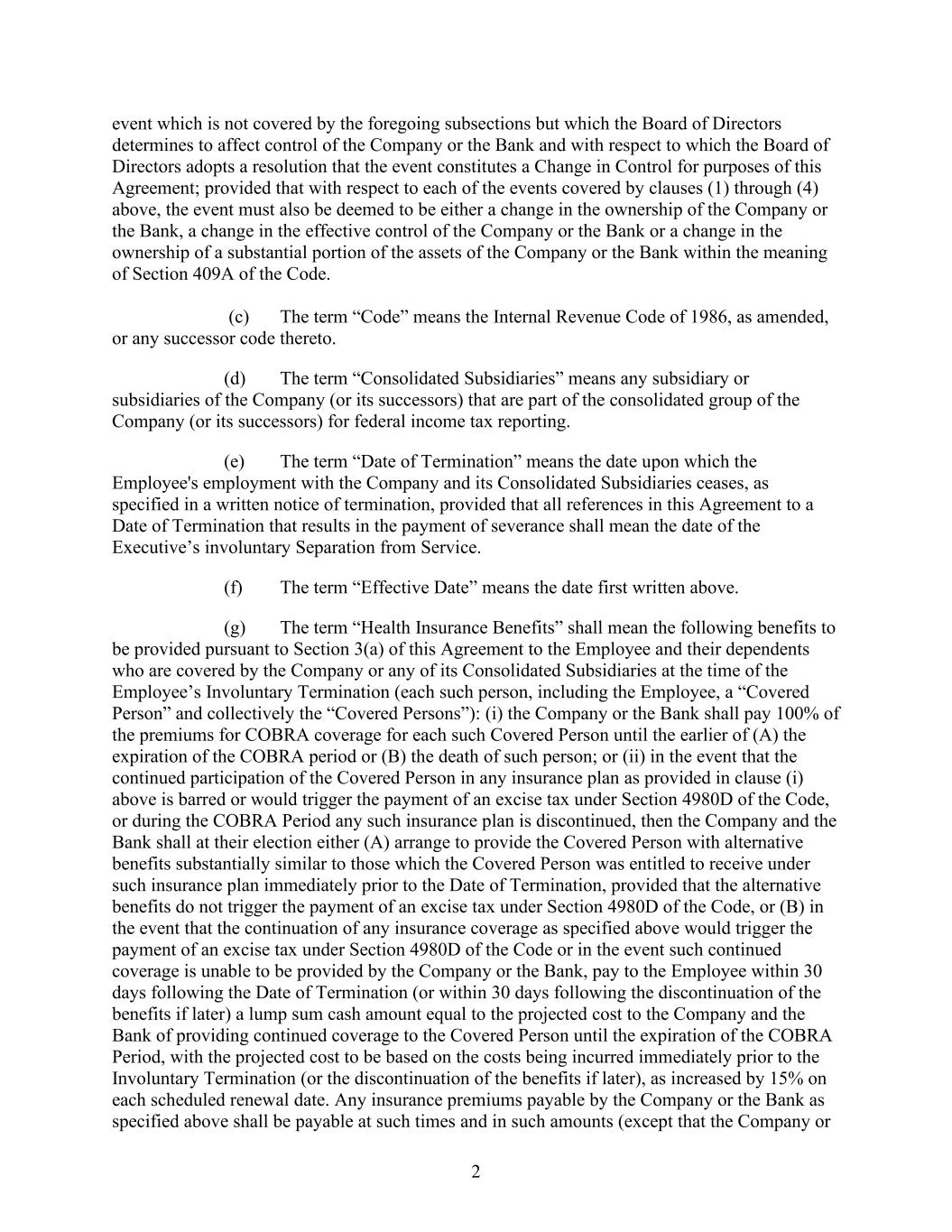
2 event which is not covered by the foregoing subsections but which the Board of Directors determines to affect control of the Company or the Bank and with respect to which the Board of Directors adopts a resolution that the event constitutes a Change in Control for purposes of this Agreement; provided that with respect to each of the events covered by clauses (1) through (4) above, the event must also be deemed to be either a change in the ownership of the Company or the Bank, a change in the effective control of the Company or the Bank or a change in the ownership of a substantial portion of the assets of the Company or the Bank within the meaning of Section 409A of the Code. (c) The term “Code” means the Internal Revenue Code of 1986, as amended, or any successor code thereto. (d) The term “Consolidated Subsidiaries” means any subsidiary or subsidiaries of the Company (or its successors) that are part of the consolidated group of the Company (or its successors) for federal income tax reporting. (e) The term “Date of Termination” means the date upon which the Employee's employment with the Company and its Consolidated Subsidiaries ceases, as specified in a written notice of termination, provided that all references in this Agreement to a Date of Termination that results in the payment of severance shall mean the date of the Executive’s involuntary Separation from Service. (f) The term “Effective Date” means the date first written above. (g) The term “Health Insurance Benefits” shall mean the following benefits to be provided pursuant to Section 3(a) of this Agreement to the Employee and their dependents who are covered by the Company or any of its Consolidated Subsidiaries at the time of the Employee’s Involuntary Termination (each such person, including the Employee, a “Covered Person” and collectively the “Covered Persons”): (i) the Company or the Bank shall pay 100% of the premiums for COBRA coverage for each such Covered Person until the earlier of (A) the expiration of the COBRA period or (B) the death of such person; or (ii) in the event that the continued participation of the Covered Person in any insurance plan as provided in clause (i) above is barred or would trigger the payment of an excise tax under Section 4980D of the Code, or during the COBRA Period any such insurance plan is discontinued, then the Company and the Bank shall at their election either (A) arrange to provide the Covered Person with alternative benefits substantially similar to those which the Covered Person was entitled to receive under such insurance plan immediately prior to the Date of Termination, provided that the alternative benefits do not trigger the payment of an excise tax under Section 4980D of the Code, or (B) in the event that the continuation of any insurance coverage as specified above would trigger the payment of an excise tax under Section 4980D of the Code or in the event such continued coverage is unable to be provided by the Company or the Bank, pay to the Employee within 30 days following the Date of Termination (or within 30 days following the discontinuation of the benefits if later) a lump sum cash amount equal to the projected cost to the Company and the Bank of providing continued coverage to the Covered Person until the expiration of the COBRA Period, with the projected cost to be based on the costs being incurred immediately prior to the Involuntary Termination (or the discontinuation of the benefits if later), as increased by 15% on each scheduled renewal date. Any insurance premiums payable by the Company or the Bank as specified above shall be payable at such times and in such amounts (except that the Company or
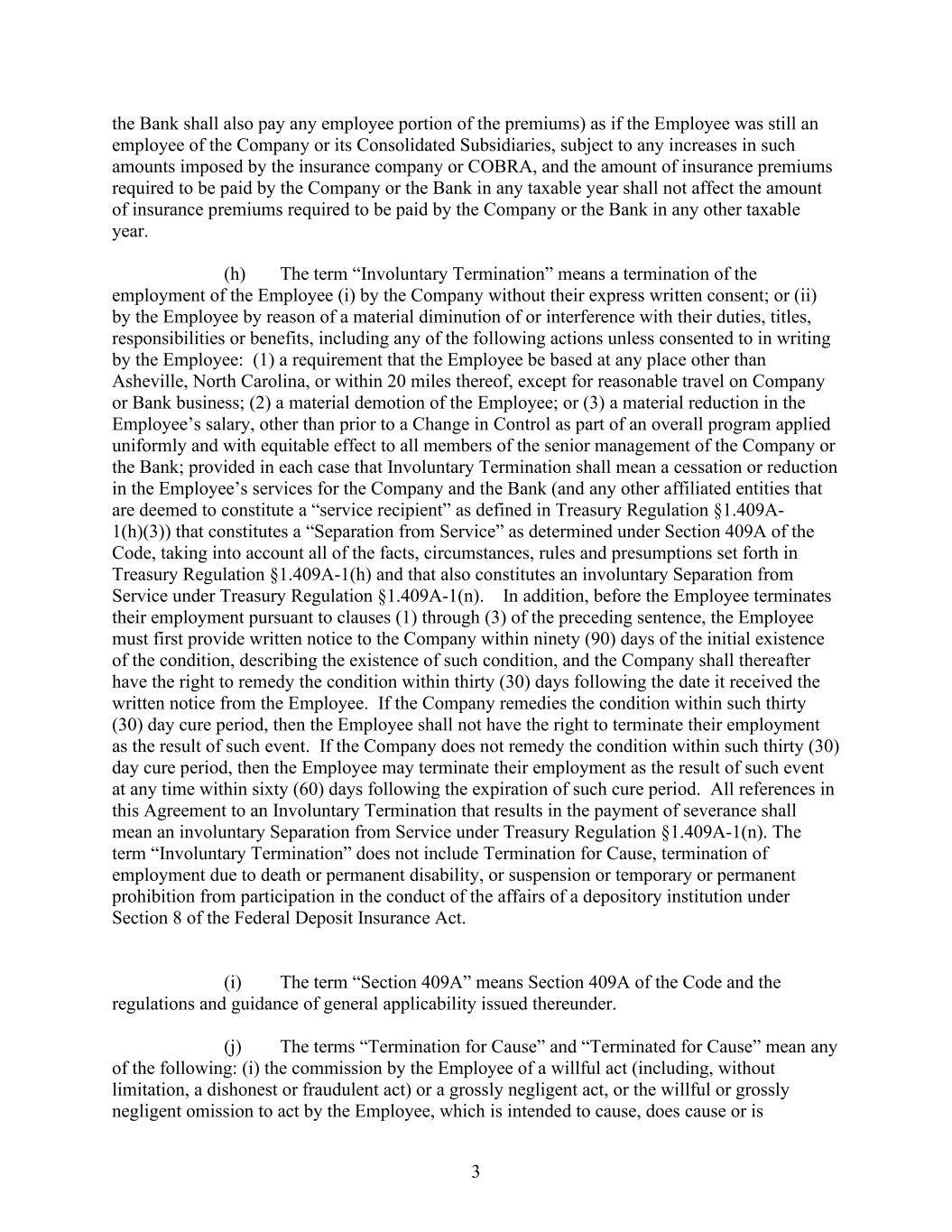
3 the Bank shall also pay any employee portion of the premiums) as if the Employee was still an employee of the Company or its Consolidated Subsidiaries, subject to any increases in such amounts imposed by the insurance company or COBRA, and the amount of insurance premiums required to be paid by the Company or the Bank in any taxable year shall not affect the amount of insurance premiums required to be paid by the Company or the Bank in any other taxable year. (h) The term “Involuntary Termination” means a termination of the employment of the Employee (i) by the Company without their express written consent; or (ii) by the Employee by reason of a material diminution of or interference with their duties, titles, responsibilities or benefits, including any of the following actions unless consented to in writing by the Employee: (1) a requirement that the Employee be based at any place other than Asheville, North Carolina, or within 20 miles thereof, except for reasonable travel on Company or Bank business; (2) a material demotion of the Employee; or (3) a material reduction in the Employee’s salary, other than prior to a Change in Control as part of an overall program applied uniformly and with equitable effect to all members of the senior management of the Company or the Bank; provided in each case that Involuntary Termination shall mean a cessation or reduction in the Employee’s services for the Company and the Bank (and any other affiliated entities that are deemed to constitute a “service recipient” as defined in Treasury Regulation §1.409A- 1(h)(3)) that constitutes a “Separation from Service” as determined under Section 409A of the Code, taking into account all of the facts, circumstances, rules and presumptions set forth in Treasury Regulation §1.409A-1(h) and that also constitutes an involuntary Separation from Service under Treasury Regulation §1.409A-1(n). In addition, before the Employee terminates their employment pursuant to clauses (1) through (3) of the preceding sentence, the Employee must first provide written notice to the Company within ninety (90) days of the initial existence of the condition, describing the existence of such condition, and the Company shall thereafter have the right to remedy the condition within thirty (30) days following the date it received the written notice from the Employee. If the Company remedies the condition within such thirty (30) day cure period, then the Employee shall not have the right to terminate their employment as the result of such event. If the Company does not remedy the condition within such thirty (30) day cure period, then the Employee may terminate their employment as the result of such event at any time within sixty (60) days following the expiration of such cure period. All references in this Agreement to an Involuntary Termination that results in the payment of severance shall mean an involuntary Separation from Service under Treasury Regulation §1.409A-1(n). The term “Involuntary Termination” does not include Termination for Cause, termination of employment due to death or permanent disability, or suspension or temporary or permanent prohibition from participation in the conduct of the affairs of a depository institution under Section 8 of the Federal Deposit Insurance Act. (i) The term “Section 409A” means Section 409A of the Code and the regulations and guidance of general applicability issued thereunder. (j) The terms “Termination for Cause” and “Terminated for Cause” mean any of the following: (i) the commission by the Employee of a willful act (including, without limitation, a dishonest or fraudulent act) or a grossly negligent act, or the willful or grossly negligent omission to act by the Employee, which is intended to cause, does cause or is
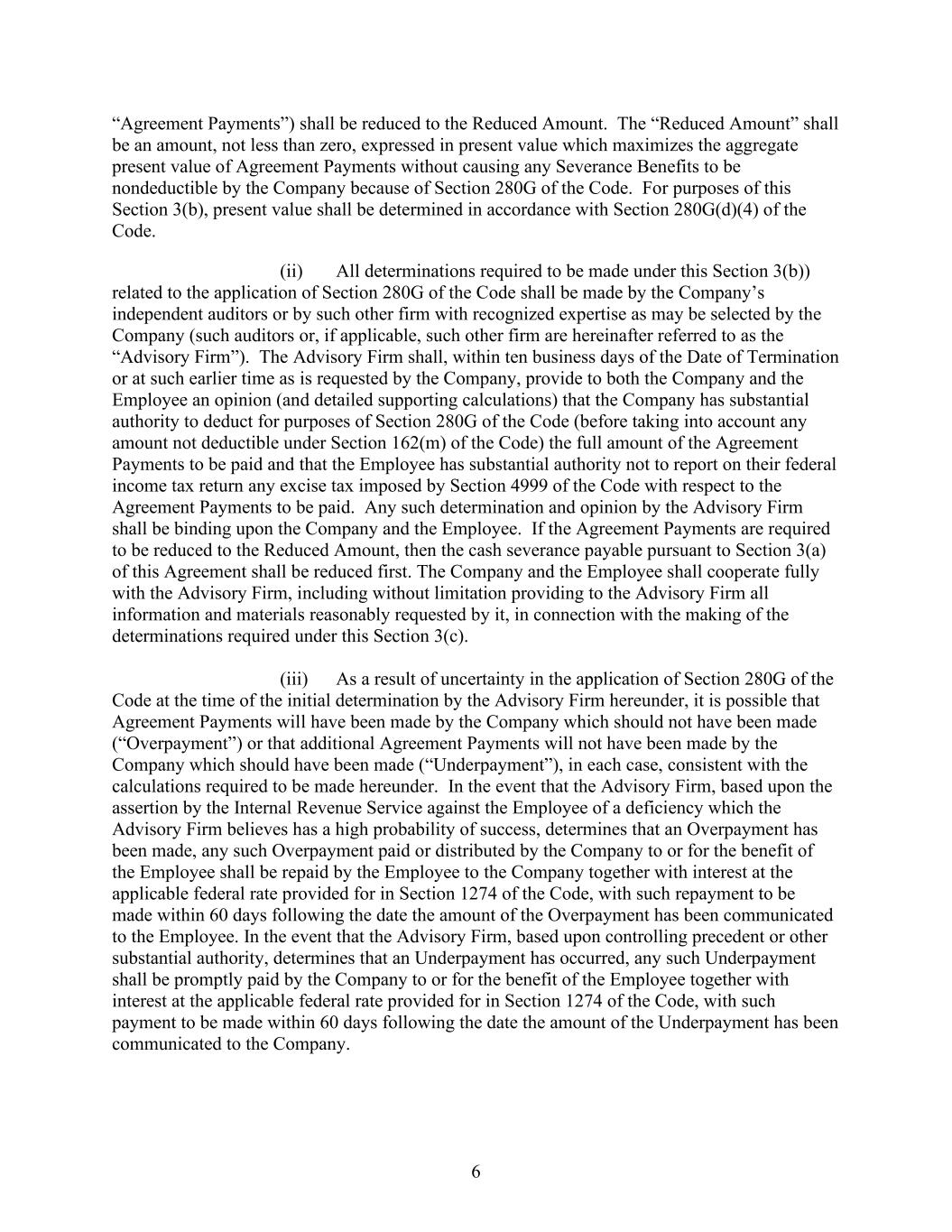
6 “Agreement Payments”) shall be reduced to the Reduced Amount. The “Reduced Amount” shall be an amount, not less than zero, expressed in present value which maximizes the aggregate present value of Agreement Payments without causing any Severance Benefits to be nondeductible by the Company because of Section 280G of the Code. For purposes of this Section 3(b), present value shall be determined in accordance with Section 280G(d)(4) of the Code. (ii) All determinations required to be made under this Section 3(b)) related to the application of Section 280G of the Code shall be made by the Company’s independent auditors or by such other firm with recognized expertise as may be selected by the Company (such auditors or, if applicable, such other firm are hereinafter referred to as the “Advisory Firm”). The Advisory Firm shall, within ten business days of the Date of Termination or at such earlier time as is requested by the Company, provide to both the Company and the Employee an opinion (and detailed supporting calculations) that the Company has substantial authority to deduct for purposes of Section 280G of the Code (before taking into account any amount not deductible under Section 162(m) of the Code) the full amount of the Agreement Payments to be paid and that the Employee has substantial authority not to report on their federal income tax return any excise tax imposed by Section 4999 of the Code with respect to the Agreement Payments to be paid. Any such determination and opinion by the Advisory Firm shall be binding upon the Company and the Employee. If the Agreement Payments are required to be reduced to the Reduced Amount, then the cash severance payable pursuant to Section 3(a) of this Agreement shall be reduced first. The Company and the Employee shall cooperate fully with the Advisory Firm, including without limitation providing to the Advisory Firm all information and materials reasonably requested by it, in connection with the making of the determinations required under this Section 3(c). (iii) As a result of uncertainty in the application of Section 280G of the Code at the time of the initial determination by the Advisory Firm hereunder, it is possible that Agreement Payments will have been made by the Company which should not have been made (“Overpayment”) or that additional Agreement Payments will not have been made by the Company which should have been made (“Underpayment”), in each case, consistent with the calculations required to be made hereunder. In the event that the Advisory Firm, based upon the assertion by the Internal Revenue Service against the Employee of a deficiency which the Advisory Firm believes has a high probability of success, determines that an Overpayment has been made, any such Overpayment paid or distributed by the Company to or for the benefit of the Employee shall be repaid by the Employee to the Company together with interest at the applicable federal rate provided for in Section 1274 of the Code, with such repayment to be made within 60 days following the date the amount of the Overpayment has been communicated to the Employee. In the event that the Advisory Firm, based upon controlling precedent or other substantial authority, determines that an Underpayment has occurred, any such Underpayment shall be promptly paid by the Company to or for the benefit of the Employee together with interest at the applicable federal rate provided for in Section 1274 of the Code, with such payment to be made within 60 days following the date the amount of the Underpayment has been communicated to the Company.
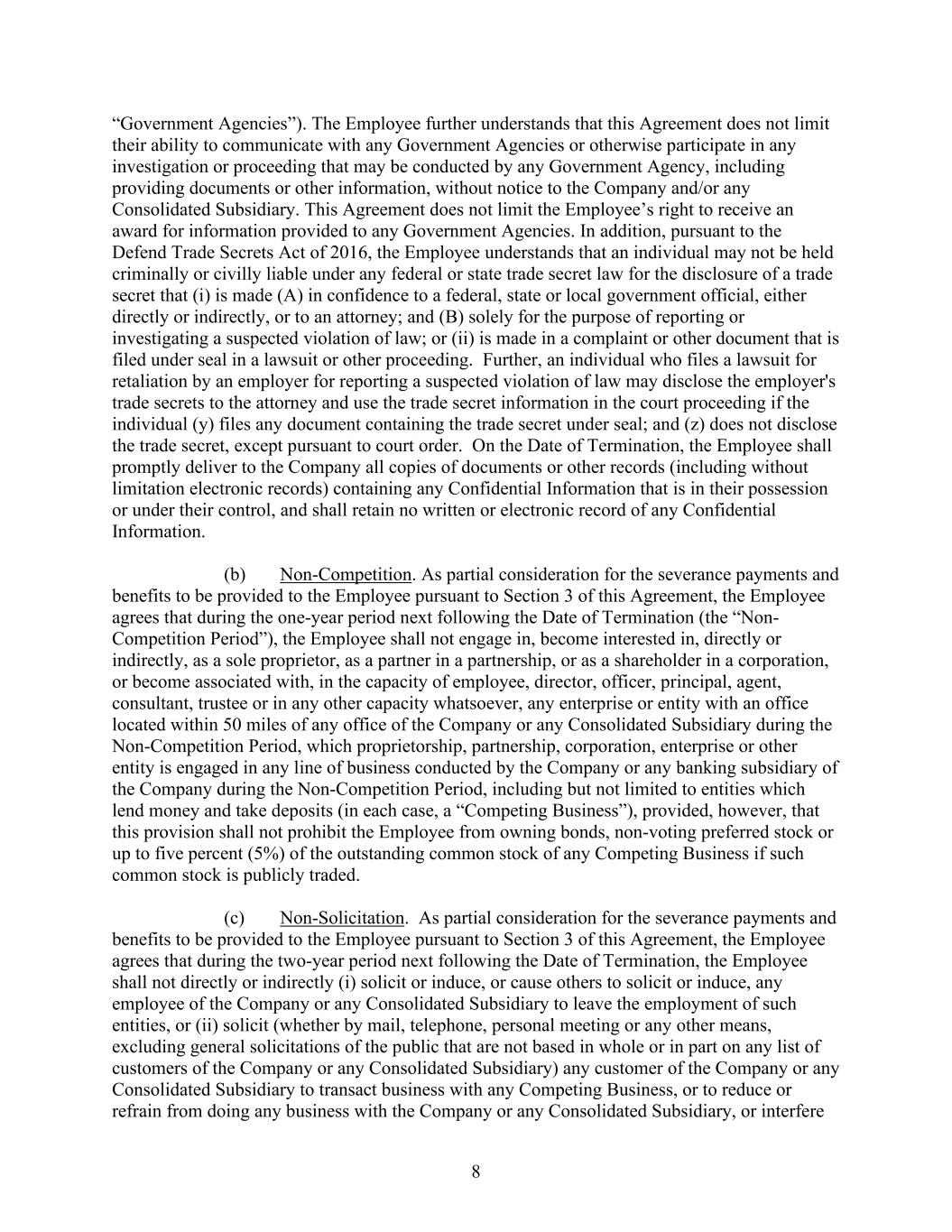
8 “Government Agencies”). The Employee further understands that this Agreement does not limit their ability to communicate with any Government Agencies or otherwise participate in any investigation or proceeding that may be conducted by any Government Agency, including providing documents or other information, without notice to the Company and/or any Consolidated Subsidiary. This Agreement does not limit the Employee’s right to receive an award for information provided to any Government Agencies. In addition, pursuant to the Defend Trade Secrets Act of 2016, the Employee understands that an individual may not be held criminally or civilly liable under any federal or state trade secret law for the disclosure of a trade secret that (i) is made (A) in confidence to a federal, state or local government official, either directly or indirectly, or to an attorney; and (B) solely for the purpose of reporting or investigating a suspected violation of law; or (ii) is made in a complaint or other document that is filed under seal in a lawsuit or other proceeding. Further, an individual who files a lawsuit for retaliation by an employer for reporting a suspected violation of law may disclose the employer's trade secrets to the attorney and use the trade secret information in the court proceeding if the individual (y) files any document containing the trade secret under seal; and (z) does not disclose the trade secret, except pursuant to court order. On the Date of Termination, the Employee shall promptly deliver to the Company all copies of documents or other records (including without limitation electronic records) containing any Confidential Information that is in their possession or under their control, and shall retain no written or electronic record of any Confidential Information. (b) Non-Competition. As partial consideration for the severance payments and benefits to be provided to the Employee pursuant to Section 3 of this Agreement, the Employee agrees that during the one-year period next following the Date of Termination (the “Non- Competition Period”), the Employee shall not engage in, become interested in, directly or indirectly, as a sole proprietor, as a partner in a partnership, or as a shareholder in a corporation, or become associated with, in the capacity of employee, director, officer, principal, agent, consultant, trustee or in any other capacity whatsoever, any enterprise or entity with an office located within 50 miles of any office of the Company or any Consolidated Subsidiary during the Non-Competition Period, which proprietorship, partnership, corporation, enterprise or other entity is engaged in any line of business conducted by the Company or any banking subsidiary of the Company during the Non-Competition Period, including but not limited to entities which lend money and take deposits (in each case, a “Competing Business”), provided, however, that this provision shall not prohibit the Employee from owning bonds, non-voting preferred stock or up to five percent (5%) of the outstanding common stock of any Competing Business if such common stock is publicly traded. (c) Non-Solicitation. As partial consideration for the severance payments and benefits to be provided to the Employee pursuant to Section 3 of this Agreement, the Employee agrees that during the two-year period next following the Date of Termination, the Employee shall not directly or indirectly (i) solicit or induce, or cause others to solicit or induce, any employee of the Company or any Consolidated Subsidiary to leave the employment of such entities, or (ii) solicit (whether by mail, telephone, personal meeting or any other means, excluding general solicitations of the public that are not based in whole or in part on any list of customers of the Company or any Consolidated Subsidiary) any customer of the Company or any Consolidated Subsidiary to transact business with any Competing Business, or to reduce or refrain from doing any business with the Company or any Consolidated Subsidiary, or interfere
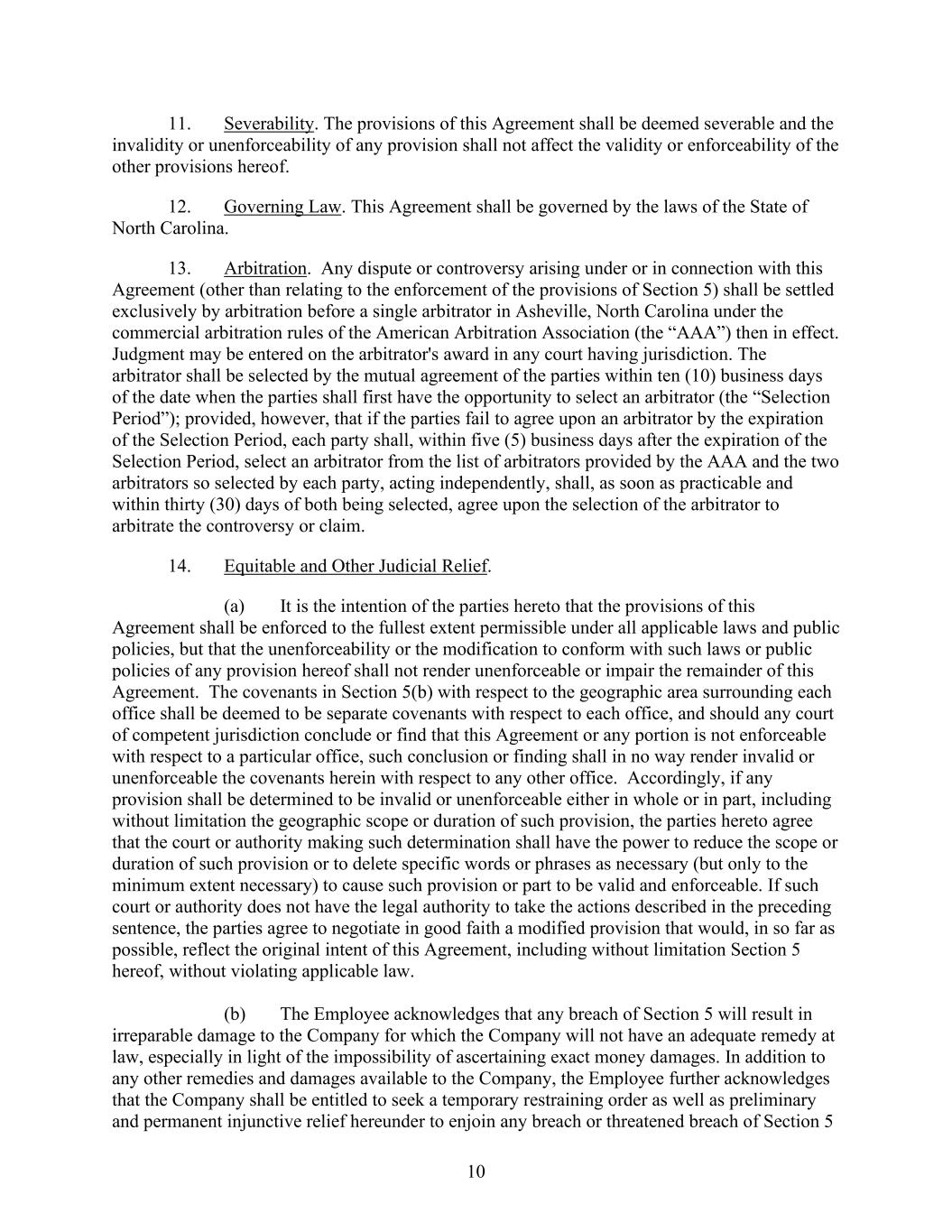
10 11. Severability. The provisions of this Agreement shall be deemed severable and the invalidity or unenforceability of any provision shall not affect the validity or enforceability of the other provisions hereof. 12. Governing Law. This Agreement shall be governed by the laws of the State of North Carolina. 13. Arbitration. Any dispute or controversy arising under or in connection with this Agreement (other than relating to the enforcement of the provisions of Section 5) shall be settled exclusively by arbitration before a single arbitrator in Asheville, North Carolina under the commercial arbitration rules of the American Arbitration Association (the “AAA”) then in effect. Judgment may be entered on the arbitrator's award in any court having jurisdiction. The arbitrator shall be selected by the mutual agreement of the parties within ten (10) business days of the date when the parties shall first have the opportunity to select an arbitrator (the “Selection Period”); provided, however, that if the parties fail to agree upon an arbitrator by the expiration of the Selection Period, each party shall, within five (5) business days after the expiration of the Selection Period, select an arbitrator from the list of arbitrators provided by the AAA and the two arbitrators so selected by each party, acting independently, shall, as soon as practicable and within thirty (30) days of both being selected, agree upon the selection of the arbitrator to arbitrate the controversy or claim. 14. Equitable and Other Judicial Relief. (a) It is the intention of the parties hereto that the provisions of this Agreement shall be enforced to the fullest extent permissible under all applicable laws and public policies, but that the unenforceability or the modification to conform with such laws or public policies of any provision hereof shall not render unenforceable or impair the remainder of this Agreement. The covenants in Section 5(b) with respect to the geographic area surrounding each office shall be deemed to be separate covenants with respect to each office, and should any court of competent jurisdiction conclude or find that this Agreement or any portion is not enforceable with respect to a particular office, such conclusion or finding shall in no way render invalid or unenforceable the covenants herein with respect to any other office. Accordingly, if any provision shall be determined to be invalid or unenforceable either in whole or in part, including without limitation the geographic scope or duration of such provision, the parties hereto agree that the court or authority making such determination shall have the power to reduce the scope or duration of such provision or to delete specific words or phrases as necessary (but only to the minimum extent necessary) to cause such provision or part to be valid and enforceable. If such court or authority does not have the legal authority to take the actions described in the preceding sentence, the parties agree to negotiate in good faith a modified provision that would, in so far as possible, reflect the original intent of this Agreement, including without limitation Section 5 hereof, without violating applicable law. (b) The Employee acknowledges that any breach of Section 5 will result in irreparable damage to the Company for which the Company will not have an adequate remedy at law, especially in light of the impossibility of ascertaining exact money damages. In addition to any other remedies and damages available to the Company, the Employee further acknowledges that the Company shall be entitled to seek a temporary restraining order as well as preliminary and permanent injunctive relief hereunder to enjoin any breach or threatened breach of Section 5
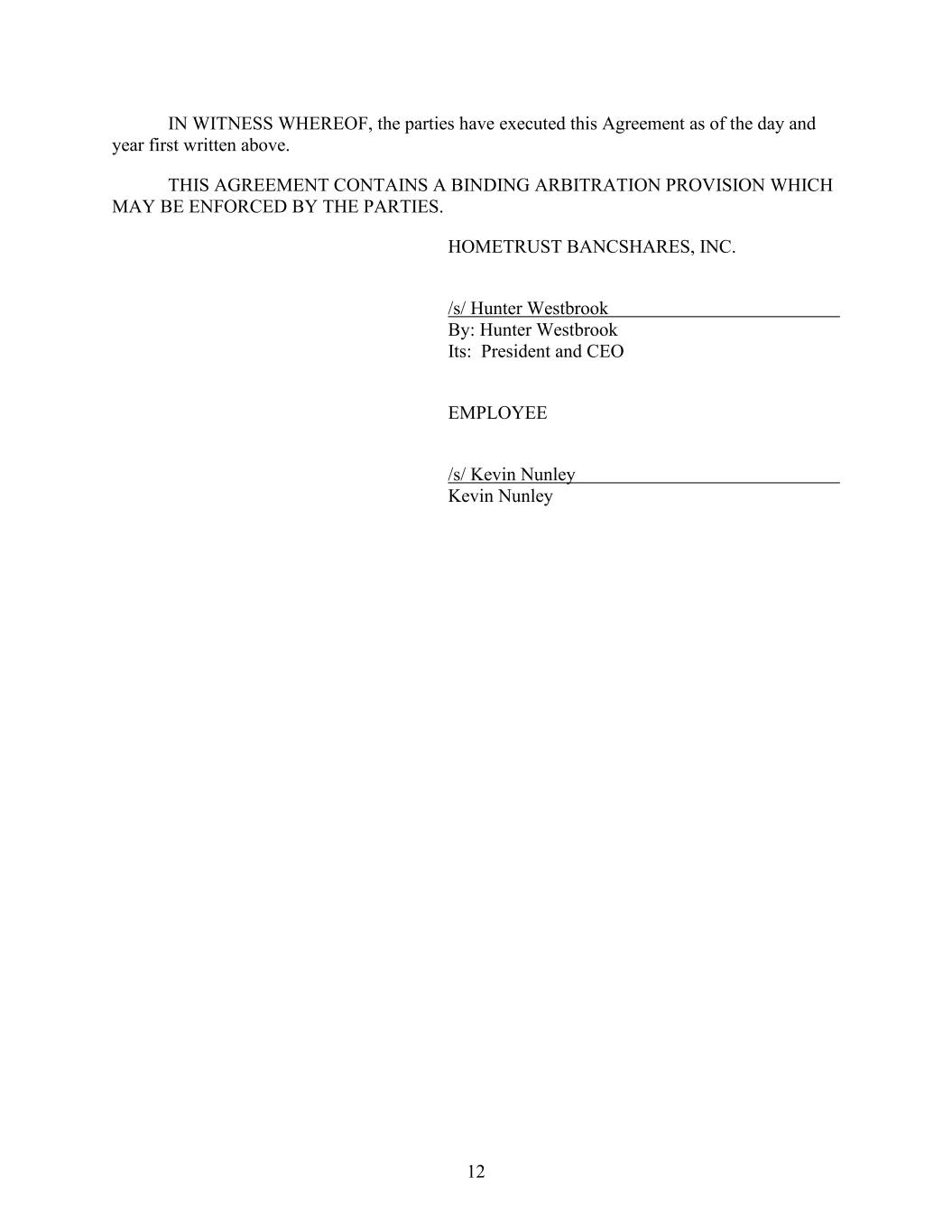
12 IN WITNESS WHEREOF, the parties have executed this Agreement as of the day and year first written above. THIS AGREEMENT CONTAINS A BINDING ARBITRATION PROVISION WHICH MAY BE ENFORCED BY THE PARTIES. HOMETRUST BANCSHARES, INC. /s/ Xxxxxx Xxxxxxxxx By: Xxxxxx Xxxxxxxxx Its: President and CEO EMPLOYEE /s/ Xxxxx Xxxxxx Xxxxx Xxxxxx





